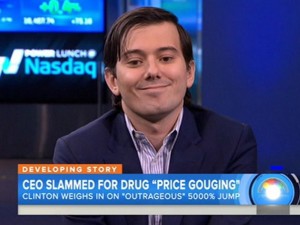
17 December 2015 – In the wake of tragedy, you hear it a lot. “We are all New York.” “We are all Paris.” It’s about solidarity.
Well, let me tell you about a tragedy where you’ve got solidarity coming out of every pore.
A good portion of you are likely aware that Martin Shkreli was arrested for securities fraud unrelated to his actions in hiking the price of just about every life-saving drug that he could get his hands on. But the securities fraud thing isn’t what I’m here to discuss. It’s the drug price thing, because there is some other recent news about Shkreli that you may not have heard.
Last week, his latest purchase, a company called KaloBios Pharmaceuticals, was announced to be seeking US approval for benznidazole, a decades-old treatment for the horrible parasitic Chagas disease. Chagas disease is a major problem in South America, where its effects destroy patients’ ability to work and can eventually be lethal by causing heart failure. Of course, in typical Shkreli style, they’re planning to jack up the price for two months of treatment to where it’s comparable to brand-new drugs for Hepatitis C virus. Those new treatments run about $100,000 for a 12-week course. I don’t think I need to say this, but benznidazole doesn’t cost that, and there’s no reason that it should.
It’s this tragedy that makes me say that today, we are all Martin Shkreli. Normally you say that to empathize with the victims. I am saying it to indict the entirety of the developed Western world in the continual ravages of disease that other countries must suffer. When Shkreli raised the cost of a toxoplasmosis drug that is used in immunocompromised HIV patients, we arose in an uproar to combat this price-gouging heartless scourge of the seven major organ systems. But we didn’t spend half a second thinking about why men like Shkreli exist. Now we are decrying his plans for benznidazole.
But no one is asking the hard question of why he was able to do this. You see, Shkreli took advantage of a program that was meant to encourage new drug development for what are called “neglected tropical diseases,” or NTDs. NTDs are anything that kills lots of people in “less developed” or “emerging” or “least developed” or, in other words “poor because the West has treated them like crap,” countries. They’re called “neglected” because you can’t get research funding for them like you can for other diseases. I worked on these kinds of programs when I was a policy fellow. We struggled to get any kind of political motivation to fund research that would save millions of lives. If you want a picture of the inequality in research we create here, look at this handy one from Reuters:
The reason for the imbalance here? Well, the lives on the right aren’t American, so nobody cared. And by the way, you can insert other developed countries into that sentence. You’re not off the hook either, Europe.
Neglected tropical diseases are a category that includes everything from the uncommon Japanese encephalitis, which affects about 67,000 people a year, to the juggernaut Dengue fever, which has an annual patient count that is estimated to be between 50 and 500 million. No, I didn’t mis-state that. There’s a fever that can annually infect 1 in 15 people and it is considered “neglected” because we can’t get enough money to research treatments and vaccines.
We can’t get that money for a few reasons. First, politicians are difficult to convince to provide research grants on these things. That’s not the only reason, though. Another reason is that pharmaceutical companies don’t have much incentive to spend the huge amounts of money that it takes to develop these drugs when the market is mostly people who live on less than $2 a day.
Bottom line: it’s more profitable to give erections to aging millionaires, so that’s what we do.
The news media could have stepped in countless times with countless similar drug stories. The entirety of our culture could have paid any attention and said “hey, people are dying here — maybe we should find a better way.”
But we didn’t. And we do this for so many other treatments that it’s ridiculous. The patents that Western countries apply to drugs result in their prices being jacked up through the roof. Countries all over the developing world have complained about international law that stops them from manufacturing patented drugs that the West barely uses, but instead of taking the compassionate route, we’ve worked to make it harder to manufacture drugs that are patented in developed countries. There is a reason for this — it’s expensive to make pharmaceuticals and patents help the companies break even — but there are individual cases where the government could step in and say, “Hey, this drug for a parasitic disease that Americans only rarely get — if we agree to spend $5 million on it, could you reduce the price of it?” It’s called an Advance Market Commitment, and it works. In a way, it’s like kickstarter in that it creates a built-in market before a product is developed. Knowing that a drug has a built-in market helps a company plan for costs and thus price lower.
But we don’t use this method enough, and frankly I’ve come to believe it’s because Westerners don’t really care. We just like to say we do.
